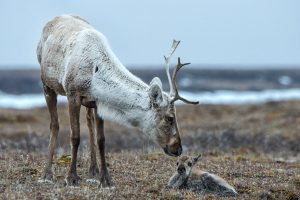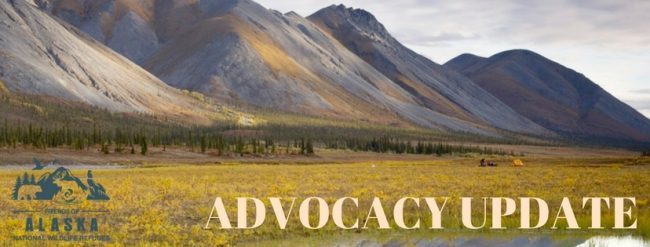Advocacy Update by David Raskin, Friends Board President
As battles continue to save the Izembek and Arctic Refuges from destructive developments, the Lower Cook Inlet Seismic Survey and proposed Ambler road have been added to the list of threats to our Alaska refuges.
Izembek NWR
We have no news on the August 7, 2019 suit filed in federal district court that names Friends as the lead plaintiff along with the same eight conservation partners. This suit includes the numerous legal claims against the agreement, and we are confident that we will again prevail. Trustees also submitted to DOI “Notice of Violation of the Endangered Species Act Section 7 for Failing to Consult Regarding the Izembek Land Exchange” and intent to sue the DOI on behalf of the same plaintiffs. We will provide updates as these work their way through the legal process
Arctic NWR
There is much news concerning DOI plans to sell leases this year for oil and gas development in the Coastal Plain of the Arctic Refuge. The BLM Final EIS is now expected in September, with a decision soon after the close of the 30-day comment period. Since the DEIS was so hastily done and grossly inadequate, without a new DEIS process it is likely that a Final EIS will be insufficient to withstand legal challenges. In the meantime, Joe Balash, who spearheaded the effort at DOI, resigned to take an executive position with Oil Search, a Papua New Guinea oil firm with development interests on the North Slope. His taking a job with the oil industry raised ethical questions, as well as concerns about his possible role in the suppression of scientific reports and alteration of federal agency analyses about the impacts of proposed oil development. Another major event is the sale of BP’s Alaska assets to Hilcorp of Texas. Hilcorp has an abysmal environmental record, having been fined $3 million for at least 68 environmental violations since the year 2000. However, the departure of BP is another indication of the lack of interest of major companies in the oil potential of the Coastal Plain. Other good news concerns difficulties for the proposed seismic exploration. A study from researchers at UAF indicates that low snow levels and warmer temperatures on the Coastal Plain pose problems for the operation of heavy equipment and construction of ice roads to support exploration and development. With each passing month, it seems that the potential for oil and gas development on the Coastal Plain weakens as more negative information comes to light.
Another major event is the sale of BP’s Alaska assets to Hilcorp of Texas. Hilcorp has an abysmal environmental record, having been fined $3 million for at least 68 environmental violations since the year 2000. However, the departure of BP is another indication of the lack of interest of major companies in the oil potential of the Coastal Plain. Other good news concerns difficulties for the proposed seismic exploration. A study from researchers at UAF indicates that low snow levels and warmer temperatures on the Coastal Plain pose problems for the operation of heavy equipment and construction of ice roads to support exploration and development. With each passing month, it seems that the potential for oil and gas development on the Coastal Plain weakens as more negative information comes to light.
The Restore Protections Bill (HR 1146) to remove the tax bill provision that authorized the sale of leases in the Coastal Plain was introduced by Representative Jared Huffman and a record 182 cosponsors. It was reported out of committee, and a full House vote is expected in September. Although it likely will pass the House, the Senate is unlikely to pass it. Also, the Arctic Refuge Protection Act is expected to be introduced in the Senate on September 10. It would designate the Coastal Plain of the Arctic National Wildlife Refuge a wilderness area and protect its sensitive coastal plain from oil and gas leasing and development. The bill is co-sponsored by Sen. Michael Bennet (CO); Sen. Maria Cantwell (WA); Sen. Tom Carper (DE); Sen. Ed Markey (MA); Sen. Charles Schumer (NY); and Sen. Tom Udall (NM). Friends joined a thank-you letter to these senators.
Predator Control and Hunting Regulations
The release of the proposed Kenai Refuge predator control regulations is expected very soon. The most serious threat to wildlife is the likely regulation to allow hunting of brown bears over bait. At a minimum, Friends will urge the Kenai Refuge to develop a permit process to limit the areas of the Refuge and number of bears to be taken, consistent with mandated management practices and potential threats to the brown bear population.
The U.S. Fish and Wildlife Service 2019–2020 Station-Specific Hunting and Sport Fishing Regulations, Proposed Rule (Regulation Identifier Number 1018-BD79) that was drafted by the DOI in Washington eliminated Alaska USFWS regulations that prohibit the taking of wildlife on the same day that hunters fly in. That regulation was designed to prevent illegal and unethical use of aircraft that could decimate wildlife populations. However, we have been informed by USFWS that the eliminated rule was redundant with the existing national regulation that still prohibits such same-day hunting.
Lower Cook Inlet Seismic Survey
Hilcorp is planning a seismic survey of its offshore lease site in lower Cook Inlet to search for untapped oil and gas deposits near Anchor Point and Homer. Such seismic blasting can reach 250 decibels and be heard for very long distances. This large number of high intensity blasts would cover 370 square miles, much of it within waters of the Alaska Maritime National Wildlife Refuge.
Relying on the in-house analysis by Hilcorp of potential impacts on fisheries, marine mammals, including the endangered beluga whales, and other marine life, the Bureau of Ocean Energy Management released an environmental assessment that concluded there would be no significant impact of the seismic activities. Allowing no opportunity for public input, the Bureau claimed the seismic survey would have negligible effects on marine life and birds. NOAA also announced provisions that allow Hilcorp’s proposed oil and gas activities in Cook Inlet by claiming to minimize harm to marine mammals over the next five years.
Since the proposed activities are within the boundaries of the Alaska Maritime National Wildlife Refuge, Hilcorp must receive a permit from the USFWS before proceeding with their plans this year. However, the Center for Biological Diversity just filed suit against the administration to stop Hilcorp’s plans that will disrupt the feeding and mating activities of endangered beluga whales and could drive them closer to extinction, in violation of the Marine Mammal Protection Act and Endangered Species Act.
Ambler Road
The proposed 211-mile long Ambler industrial road is on an “unprecedented, extreme fast track,” according to a BLM official. This road could have major impacts on national wildlife refuges and parks in northern Alaska. A DEIS meeting regarding the Ambler Road is scheduled in Anchorage on Tuesday, September 10 from 6-8 pm in the Dena’ina Civic and Convention Center and in Fairbanks on Monday, September 23 from 6-8:30 p.m. at the Wedgewood Resort (see https://www.nps.gov/gaar/learn/management/ambler-row.htm for more information). The draft EIS limited to 150 pages that lack details and fails to address anything outside of the road construction, e.g., impacts to the Dalton Highway or any mining actions.
